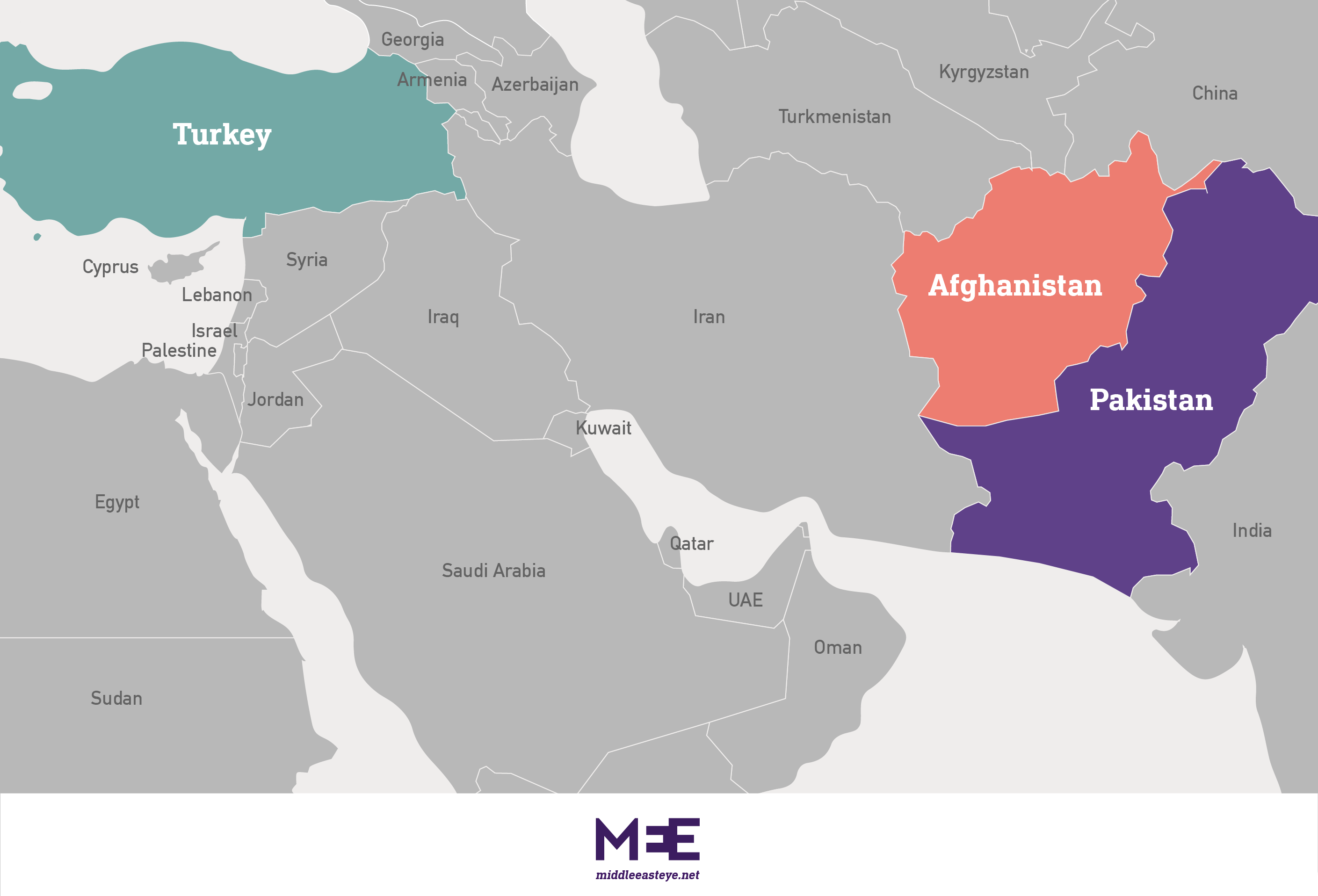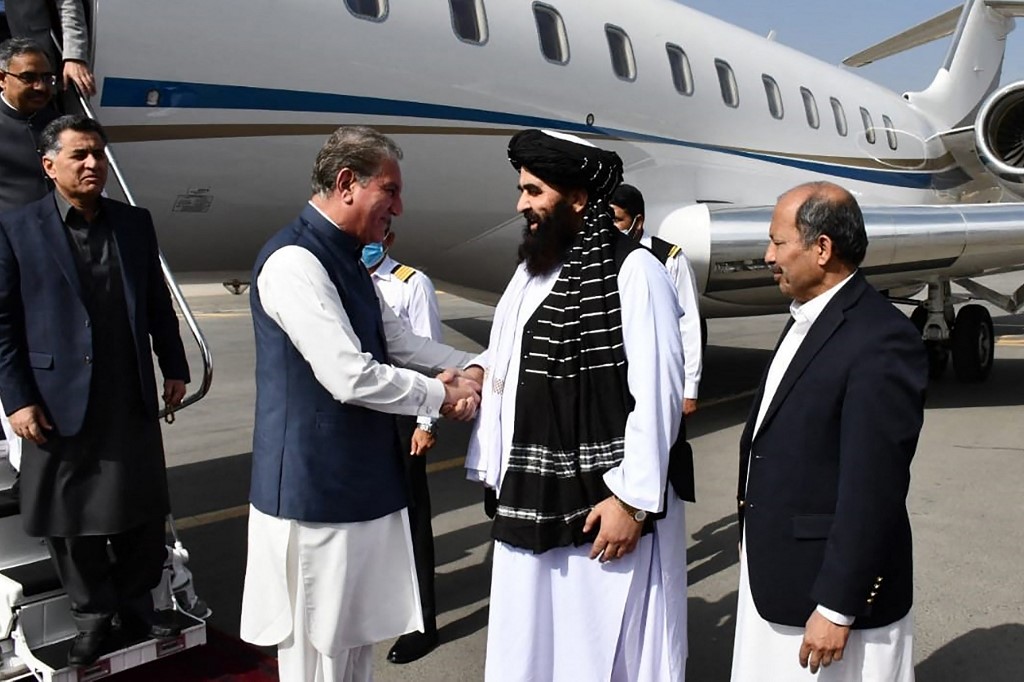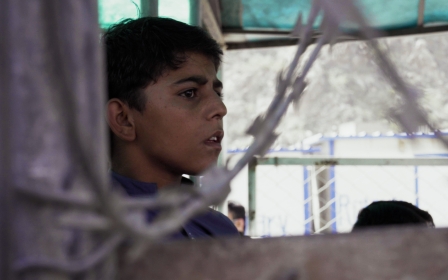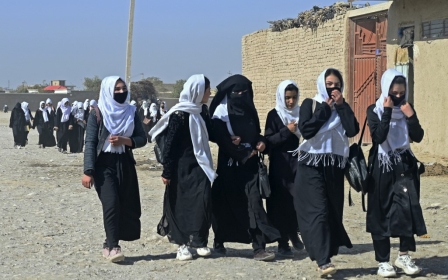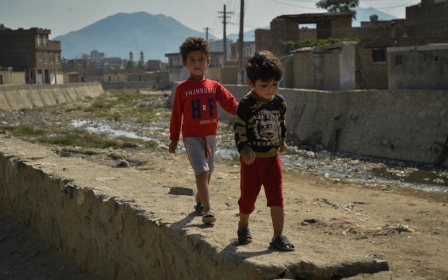Turkey and Pakistan vying for influence in Afghanistan after Taliban’s takeover
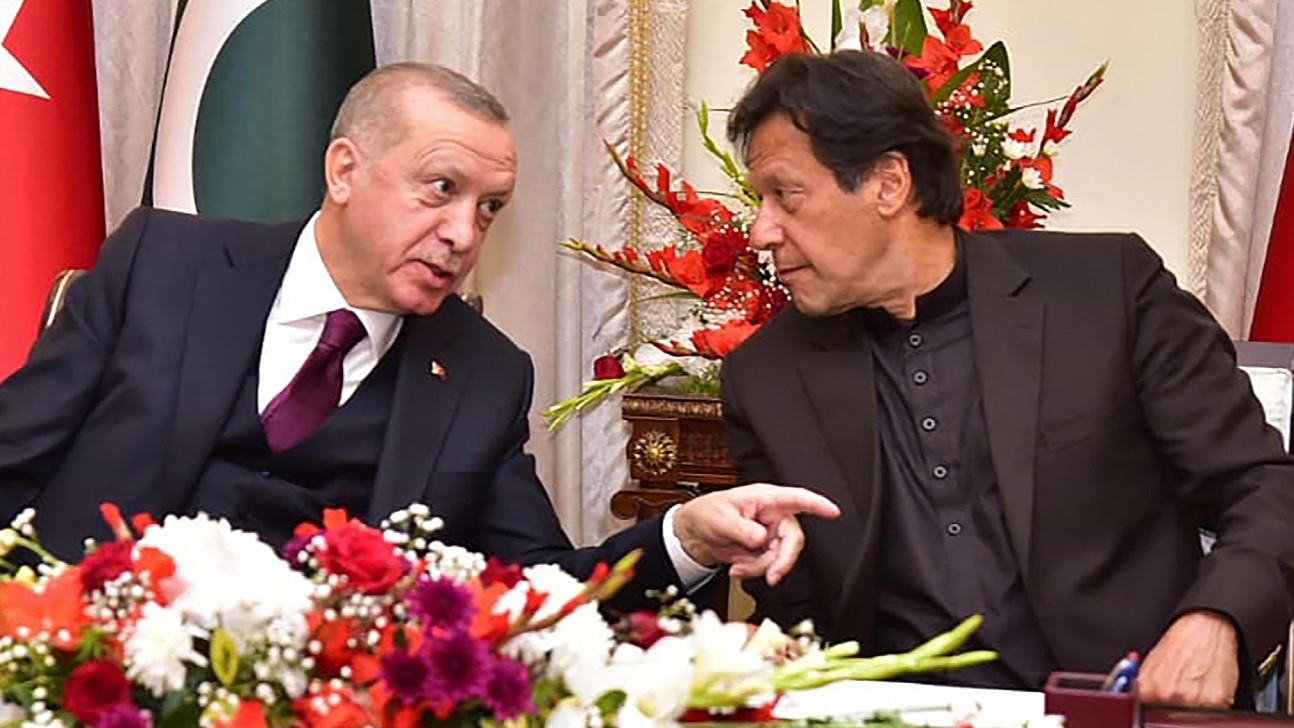
The US withdrawal from Afghanistan, completed in mid-August, and the Taliban’s takeover of the country, has ushered in a new era of diplomatic rivalry between Turkey and Pakistan as both countries compete to preserve their interests under the new government.
It has been months since Turkish President Recep Tayyip Erdogan and Pakistan’s Prime Minister Imran Khan spoke, reflecting the current tension between the two erstwhile friends.
Analysts and diplomatic sources believe the reason for this tension is Turkey’s disappointment that Pakistan has not provided sufficient help for Ankara to wield influence in the new Afghanistan, now under the rule of the Taliban.
Ankara expected Islamabad to use its influence over the Taliban to lobby the group to recognise the Turkish presence in Afghanistan and help it secure the role of protecting the capital's airport.
'Pakistan insisted on not using its influence on the Taliban, and didn't play the role Turkey expected. And that, inevitably, created disappointment in Turkey,'
- Galip Dalay, Turkish analyst
However, despite the strong economic, religious, and military links between the two countries, Turkey’s attempt to gain strategic leverage in Afghanistan has been perceived in Islamabad as a threat to Pakistan’s own interests.
New MEE newsletter: Jerusalem Dispatch
Sign up to get the latest insights and analysis on Israel-Palestine, alongside Turkey Unpacked and other MEE newsletters
Galip Dalay, a doctoral researcher at the history faculty of the University of Oxford, argues that the most feasible way for Turkey to play a role in the new Afghanistan was by taking the responsibility for the security of the airport since its diplomatic role in the Afghan transition was otherwise limited.
“But Pakistan didn’t want to lose its strong hand in Afghanistan to Turkey,” he said.
“Moreover, China and Russia were cautious about Turkey playing a role in Afghanistan for the West. Considering its very close relationship with China and Russia, Pakistan tried not to create any discomfort by letting Turkey in.”
Dalay says that Turkey, on the other hand, was expecting a more cooperative approach both from the Taliban and Pakistan.
“Ankara used rhetoric that the Taliban might sympathise with, but it didn’t work. Pakistan, as well, insisted on not using its influence on the Taliban and didn't play the role Turkey expected. And that, inevitably, created disappointment in Turkey.”
Kabul airport security
The Turkish military has had a role guarding Kabul airport since 2013, alongside the US, Hungary, France, and other Nato allies.
Two months before the Taliban came to power, Erdogan and US President Joe Biden reached a verbal agreement that would have seen Turkey take over the airport's security after the vast majority of Nato forces pulled out of Afghanistan.
Erdogan asked for financial and logistical aid, as well as assistance from partner countries. Kabul Airport’s continued accessibility was at the time seen as crucial for the foreign missions, aid groups, and the Afghan government.
But the developments in August have rendered such agreement irrelevant, as Turkey itself had to withdraw its troops from Afghanistan as the Taliban rejected their presence.
Despite Turkey’s previously amicable relationship with Afghanistan, which has existed since the days of the late Ottoman Empire, the Taliban has consistently rejected the idea of continued Turkish presence in Kabul. It even warned Ankara not to make “a big mistake".
The Taliban entered Kabul much faster than expected. Even before a deal was finalised between the US and Turkey or between the Taliban and Turkey, Kabul Airport was seized by Taliban fighters.
Their high-ranking leaders arrived in the country from Pakistan, where they have been hiding for years, and established their rule with a new government, which is yet to be recognised by the international community.
Talks to secure the airport began in early 2021, according to diplomatic sources who spoke to MEE in November.
American diplomats first asked Turkish diplomats if the Turkish military could take on the security of Kabul Airport.
Turkish diplomats replied that Turkey would need assistance, intelligence cooperation, and military assistance to take on that burden, and the discussions on the proposal continued into the summer.
When Biden and Erdogan met in mid-June on the sidelines of the Nato Summit in Brussels, one of the topics on the agenda was Kabul Airport and Erdogan floated the idea that Ankara could partner with Hungary and Pakistan on a possible mission to secure the airport following the Nato withdrawal.
While the two leaders were discussing the issue of the airport’s security during the summit, Hungarian President Viktor Orban joined the conversation, and reminded them that Hungary already had experience securing the airport since its participation in the mission between 2010 and 2013, diplomatic sources who are familiar with the conversation told MEE.
Neither Pakistan nor Hungary, however, were involved in the airport security talks between the US and Turkey.
Pakistan’s support was vital for Turkey - unlike Hungary’s - since Ankara sees Pakistan as the normal conduit to the Taliban due to its longstanding relationships with key Taliban figures.
Pakistan, fearing a separatist movement on its borders, has been a key supporter of the religious Pashtun community and schools (known as madrassas) in Afghanistan since the 1970s, with financial support from Saudi Arabia.
They also gave military training to soldiers, known as “mujahideen”, in their fight against the Soviet-backed Afghan government during the 1980s.
Many of those fighters and Pashtun students of the madrassas later made up the majority of the Taliban, which emerged as the most powerful armed group in the country after the Soviet withdrawal.
They were backed at the time by both the US and Pakistan.
In 1996, when the Taliban rose to power, Pakistan was among the few countries that recognised the group as the legitimate rulers of the country.
After the US intervention in 2001, the Taliban leadership found refuge and support in Pakistan. Most of their families and businesses are still based in Pakistan - until now.
Due to their historical links, many Afghans claim that Pakistan could have prevented the Taliban from taking control after the US withdrawal if it wanted, but Pakistan denies that it still has power over the group.
‘Not constructive’
Prior to the Nato summit, the US had already asked Turkey to take a further step to cooperate with the Taliban and hold talks in Turkey between the group and the Afghan government.
The US-backed Istanbul Conference on Afghan peace, originally scheduled to be hosted in Istanbul by Turkey, Qatar, and the United Nations on 24 April, was postponed several times due to the Taliban’s non-participation. In the end, it was never held.
The Afghan government blamed the Taliban for their no-show. The Taliban later declared it would not attend any meetings until all foreign troops leave Afghanistan.
Turkish diplomatic sources, who spoke on condition of anonymity due to the sensitivity of the subject, told MEE that Islamabad did not take any “constructive actions” to convince the Taliban representatives to go to Istanbul.
“Pakistan was not happy with the fact that Turkey would develop special ties with the Taliban, which would have given it relative powers in the Istanbul talks,” the sources said, explaining that Afghanistan’s neighbour was aspiring for more power there, after the US withdrawal.
“That was disappointing for Ankara,” the sources said, adding that Turkish officials still remained hopeful that Pakistan would behave more constructively during the talks on Kabul Airport.
By June, it was obvious that the US would leave in early September and the Taliban would eventually take control of the country.
As a result, Turkey intensified its communication with the Taliban leadership based in Qatar, pushing to keep its forces in Kabul to maintain the security of the airport.
As Turkey stepped up its diplomatic efforts, Pakistan became increasingly keen not to lose its own leverage on the organisation, according to diplomatic sources.
They could foresee that soon Afghan President Ashraf Ghani would leave and the Taliban would be in full control of the country.
Turkey had been relying on Qatar and Pakistan to communicate with the Doha-based Taliban leadership since the beginning of 2021 and the preparation for the Istanbul Conference. The talks engaged high-level Taliban leaders like Abdul Ghani Baradar, now deputy prime minister, after Turkey expressed commitment to take over the airport security.
The Turkish Embassy has now relocated to Kabul, after operating from the airport for two weeks, and Turkish diplomats are in direct talks with the Taliban government.
Turkey had hoped for more, but the Taliban leadership, especially Hibatullah Akhundzada, the leader of the so-called Islamic Emirate of Afghanistan and the Taliban’s top decision maker, still only talks to Pakistan.
It is widely known that countries who seek contact with Akhundzada can only do so via Islamabad. But Pakistan did not provide the support Turkey was looking for to make a connection.
By August, the Taliban started to release statements on how they wouldn’t accept any foreign troops in Afghanistan - including Turkish troops - and how they would consider them as “occupying forces".
That was despite the fact that the Taliban was - and still is - craving international recognition and Turkey was open to welcoming its leaders in Ankara.
‘Minuscule leverage’
On 11 August, days before Taliban’s full takeover of Kabul, Turkish Defence Minister Hulusi Akar finally arrived in Pakistan to hold talks with Khan and the Pakistani defence minister.
Right after the talks with Akar, Khan did not say that his government would help Turkey secure Kabul Airport, but he did say that he was willing to help them “to have a face-to-face dialogue” with the Taliban, although he added that Pakistan might no longer have a strong leverage on Taliban.
“The best thing is for Turkey and the Taliban to have a face-to-face dialogue. So both can talk about the reasons why Kabul airport has to be secured. And so we will be talking to the Taliban, to use our influence on them, to have a face-to-face talk with Turkey,” Khan said.
“In fact, now, our leverage on the Taliban is minuscule as they think that they have won against the Americans.”
Around the same time, Erdogan said that he could even welcome a Taliban leader in Turkey if necessary, while the Taliban responded by saying such a meeting may occur “under the right circumstances".
This meeting with Erdogan has yet to take place, but the Taliban’s foreign minister Emirhan Muttaqi and an Afghan government delegation visited Ankara on 14 October to meet the Turkish foreign minister.
However, despite this meeting taking place, the Taliban remains determined not to have a Turkish military presence in Afghanistan.
Meanwhile, Turkey has not given up on its desire to be represented in Kabul and is now focused on operating the international airport.
This has been done by Qatar temporarily, but Turkey is still in talks with the Taliban to take it over permanently, according to Turkish diplomatic sources.
Ankara has underlined the importance of a stable international airport for trade and humanitarian aid for the Afghan people. Pakistan has already helped the Turkish technical team by sending equipment.
'Turkey wanted to maintain its role in the airport in terms of technical operations, but it also wanted to provide security with its military personnel'
- Abdul Basit, Nanyang Technological University
On Tuesday, Akar, said that the Turkish technical teams have been working with Qatar to operate the airport since the withdrawal of the Nato forces in mid-August.
That help is confined to running technical operations and repairs, while the Taliban is in charge of the airport’s security.
But Turkey retains the ambition to do more than just control the technical operation of the airport, according to Abdul Basit, a Pakistani author and associate research fellow at the International Centre for Political Violence and Terrorism Research at Nanyang Technological University, Singapore.
“Turkey wanted to maintain its role in the airport in terms of technical operations, but it also wanted to provide security with its military personnel,” he told MEE, explaining that the Taliban would not accept such a role.
“The US wanted to give Turkey a role, shifting the key player role of Pakistan and Qatar to Turkey, not only as a country that provided security for the airport, but as a Western diplomatic footprint in Kabul as well.”
Abdul Basit added that Pakistan “has its own problem with the Taliban, and the priority is to solve them, not Turkey’s".
Middle East Eye delivers independent and unrivalled coverage and analysis of the Middle East, North Africa and beyond. To learn more about republishing this content and the associated fees, please fill out this form. More about MEE can be found here.


